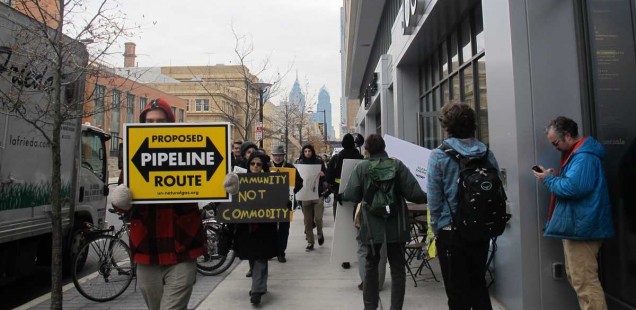
Philadelphia should resist Marcellus ‘energy hub’ vision (NewsWorks)
Commentary by Alexa Ross via NewsWorks
December 31, 2014
I was among those picketing outside the conference. Now is a key moment to show investors and industry leaders — as well as fellow Philadelphia residents — that the people who live, work and raise families in this city, the people who breathe the air and drink the water here, have different visions for the future of our home.
Proponents of the energy hub would like to convince us that, in order to have jobs, we must sacrifice our health. But we know the choice between jobs and health is a false one. Renewable and energy-efficiency sectors, clean and healthy industries, create 2 to 9 times as many jobs as coal, oil and gas for every $1 million contribution to GDP. We also know that the grave threat the energy hub poses to our community’s health is unacceptable. Three out of every 10 children living near the Philadelphia Energy Solutions refinery already has asthma. Increased disease in our children is incompatible with our vision for the future.
Proponents of the energy hub would like us to trust their projections that the Marcellus Shale will produce natural gas for 100 years. But we know that studies suggest the future supply of shale gas is extremely uncertain. We know the energy industry’s agenda is to continue profiting from fossil fuel reserves until they’re gone and communities are left with a starved economy and deteriorating health.
Unfortunately, examples are endless, from the stripped mountains of West Virginia to the 150 industrial facilities in the “Cancer Alley” of Louisiana. Consistently, dirty energy hubs condemn the surrounding communities to a life in a sacrifice zone.
The alternative to this energy-hub plan is right in front of our eyes: supporting clean work that creates vital and resilient communities. Together, the people in this city can envision a future with expanded mass transit, large-scale projects to repair aging infrastructure, urban agriculture and green spaces that buffer against the effects of climate change like hurricanes Irene and Sandy. This city could become a hub for renewable energy and for energy-efficiency jobs like home weatherization and retrofitting. These are the kinds of industries that both provide clean jobs and make our city a more resilient, healthy place to live.
Philadelphians are veterans in the fight against corporate control of the city. The assault on public education is just one example. As private interests have jockeyed for power, 23 schools are now closed, funds are mismanaged by charter schools, and two students have died because of a lack of nursing resources. This privatization agenda extends to stripping public ownership of utilities and expanding profits-first development that pushes low-income families out of their homes. In short, it means an increasing dismissal of democracy and people-first policies in every realm of government.
Standing up to the energy-hub plan is an extension of the work Philadelphians are doing all over the city to push for the real solutions we need for social and economic problems. Philadelphia Coalition Advocating for Public Schools has just launched a campaign for community schools. The Take Back Vacant Land campaign won a city land bank, and will continue to push for funding for low-income housing and land used for urban food security. The community of Eastwick is fighting to reclaim a community plagued by toxic industrial waste and flooding, by demanding neighborhood projects that create resiliency in the face of climate change.
We will resist the energy-hub plan in the good company of those in this city already fighting for a healthier, more vibrant future for Philadelphia.
—
Alexa Ross is a member of the Maypop Collective for Climate and Economic Justice, which advocates for a just transition away from a fossil-fuel economy of exploitation and greed to community-centered, clean-energy economies that take care of people and ecosystems.




